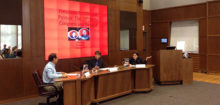As China’s top communist party leaders plan to meet in Beijing on October 18, University of Toronto’s vibrant China and Asian studies community also convened this month to discuss the past, present, and future of the Chinese Communist Party, in an academic panel organized by the Asian Institute at the Munk School of Global Affairs.
Moderated by Lynette Ong, professor of political science and fomer acting director of the Dr. David Chu Program in Contemporary Asian Studies, the panel consisted of two celebrated academics on Chinese politics: Carl Minzner, a professor at Fordham Law School in New York who specializes in Chinese law and governance; and Guoguang Wu, professor of political science and the Chair in China & Asia-Pacific Relations at the University of Victoria. Both of the panellists drew from their recent research to situate the upcoming party congress against the larger backdrop of elite political dynamics in China.
Minzner, author of the soon-to-be-published book End of an Era: How China’s Authoritarian Revival is Undermining its Rise, proposed that China’s three-decade reform era is drawing to a close. Minzner first illustrated several pre-existing political norms that have emerged after the Mao Zedong years, such as informal rules of retirement and succession within the party, stabilized legal and bureaucratic practices, and a less stringent application of the party’s ideological commitment to socialism.
However, Minzner believes that since 2012 these positive developments are under threat. Under China’s current President Xi Jiping, Minzner observes, “we have begun to see a reversal in the trend towards collective leadership and more subtle shifts towards a cult of leadership”. By using various anti-corruption campaigns to take down his own political opponents, Minzner suggests that Xi is “cannibalizing political institutions that have underlined China’s fairly stable political trajectory during the reform era and finding himself to rely on older methods to maintain political dominance”, harking back to the volatile party politics under the leadership of Mao in the 1960s and 70s.
Wu, author of the 2015 book China’s Party Congress: Power, Legitimacy, and Institutional Manipulation, delves further into the inner workings of the Communist Party Congress. “As the Chinese Communist Party’s supreme body of leadership,” Wu explains, “the party congress is a set of institutions that legitimize political authority, that possesses nominal authority, but practical impotency”. Echoing Minzner’s earlier observation, Wu suggested that while during the Mao era leadership norms have been generally unstable since the 1990s elite-level political norms have more or less been stable.
But there are signals that President Xi is leaning towards the disruption of these norms within the party itself, such as disregarding the age restrictions for the Politburo Standing Committee, avoiding to pre-appoint the next generation of party leadership, and most importantly, extending the unofficial two-term limit for himself. Although it remains to be seen whether Xi “will be either a norm-follower, a norm-breaker, or a norm-maker”, Wu proposes it is likely that we will see two scenarios: one in which Xi will redefine pre-existing practices and seek to challenge the oligarchic structure of the party, and the other in which Xi is unable to break away from these norms and thus would have to rely on alternative mechanisms to secure his rule.
How will elite-level politics affect the lives of everyday Chinese citizens? The panellists agreed that while the effects are likely going to be indirect, it is possible that criticisms of policy and the party will be less tolerated as the political atmosphere in Beijing becomes tense.
“China’s upcoming political developments will have implications for the rest of the world,” said Ong. “We Canadians, who are exploring a potential free trade deal with China, should be watching these events closely.”
Kevin Luo
September 26, 2017
